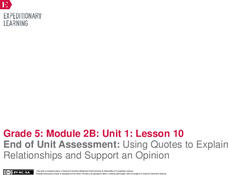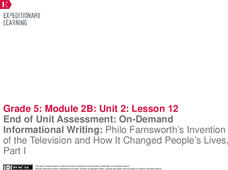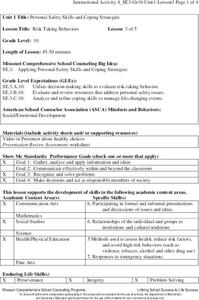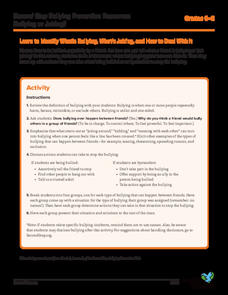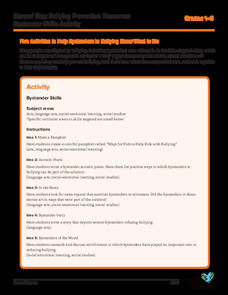Health Smart Virginia
Inclusion
Inclusion is the focus of a lesson that looks closely at how to make equal groups in cooperative settings. Using physical education activities, scholars are challenged to create groups quickly and inclusively. After several activities,...
Health Smart Virginia
Happiness
There's power in a flower. After taking a happiness survey and watching a PowerPoint about the habits of happy people, pupils decorate a paper flower with six positive affirmation statements that they feel they can benefit from reading...
Health Smart Virginia
Socially Conscious Social Networking
A powerful, award-winning video launches a lesson about socially conscious social networking. After watching the video and engaging in a full class discussion, individuals share their ideas about healthy social networking in a podcast or...
Nemours KidsHealth
Getting Along: Grades K-2
Boost social awareness with two activities focusing on getting along. In the first activity, scholars brainstorm ways to get along with their classmates and create four rules for the classroom. The second activity asks pupils to track...
Health Smart Virginia
Building Self-Esteem and Self-Image
The ninth lesson in the Health Smart series is designed to get high schoolers to understand the factors that make them feel the way they do about themselves, their bodies, and their self-worth. Pupils watch a video about teens and body...
Health Smart Virginia
Be Smart with Smartphones (and Screens)
Would you rather have a broken phone or a broken bone? This very engaging question launches a discussion about the smart use of smartphones and screens. Young scholars watch a series of videos, complete worksheets, and engage in...
Health Smart Virginia
Fitting In and Setting Healthy Boundaries
Saying "No" isn't easy. Setting healthy boundaries and sticking to them takes practice. A series of exercises enables sophomores to practice these skills and reflect on the difference between fitting in and belonging.
Delaware Coalition Against Domestic Violence
Healthy Relationships
Teach tweens and teens how to prevent dating and domestic violence with a unit on healthy relationships. The unit begins with class members taking a relationships survey. As the unit progresses, class members engage in activities that...
Nemours KidsHealth
Bullying: Grades 3-5
Two activities spotlight the concept of bullying. The first activity begins with defining and identifying characteristics of bullying. Small groups then role-play scenarios in which they practice techniques to handle a bully. The second...
Health Smart Virginia
Mental Health/Social Emotional Skills
Looking for social-emotional resources? Check out this seven-page packet that includes activity and lesson ideas, as well as links to information resources that support the social and emotional development of tenth graders.
EngageNY
End of Unit Assessment: Using Quotes to Explain Relationships and Support an Opinion
Think big! Scholars complete an end of unit assessment using their notes and graphic organizers along with the texts Big Thinkers: Was Steve Jobs This Generation’s Thomas Edison? and Steve
Jobs. To complete the assessment, they answer...
EngageNY
End of Unit Assessment: On-Demand Informational Writing: Philo Farnsworth’s Invention of the Television and How It Changed People’s Lives, Part I
On-demand isn't just for TV anymore. Writers complete their end of the unit assessment with an on-demand writing task. They read the article Television and answer questions about the gist, vocabulary, and content. They then complete a...
University of Florida
Unlock Your Leadership Potential: A Leadership Project Guide
The 359-page guide is designed to help high schoolers develop their leadership skills. Class members generate a list of leadership characteristics, research outstanding leaders, consider their own leadership style, and practice...
Nemours KidsHealth
Cyberbulling: Grades 6-8
Cyberbullying is the focus of two lessons. First, scholars discuss what cyberbullying is, and examine a problem-solving approach to handling cyberbullying, then create brochures on the topic. Second, pupils discuss the effects...
Nemours KidsHealth
Bullying: Grades 6-8
Two lessons promote social awareness and build relationship skills. In lesson plan one, scholars define bullying and role-play coping strategies. Lesson two challenges learners to diffuse a bullying situation using their knowledge of...
Nemours KidsHealth
Getting Along: Grades 3-5
Two lessons boost social awareness and spread gratitude. In the first lesson, scholars write a newspaper article that describes a conflict and ways to solve it. In the second lesson, pupils offer kindness coupons to family and friends to...
Nemours KidsHealth
Peer Pressure: Grades 9-12
Peer pressure is not always negative. It can also inspire, encourage people to get involved, and help push change. Class members select a quotation from a provided list and craft a paragraph about the meaning of the statement, how it...
Nemours KidsHealth
Healthy Relationships: Grades 9-12
After reading a series of informative articles about healthy and abusive relationships, class members demonstrate what they have learned as they take on the role of RESPECT hotline counselors and offer advice to fictional victims of...
Nemours KidsHealth
Getting Along: Grades 9-12
Wouldn't it be lovely if we could all just get along! Fortunately, the skills needed to build and maintain healthy relationships can be learned. Two activities help high schoolers build these skills. First, a class member reads a series...
Missouri Department of Elementary
Risk Taking Behaviors
Sophomores can be sometimes wise and sometimes foolish. The same can be said for their behaviors. After watching a presentation about risk taking behaviors, class members discuss the presentation in small groups, and then complete a...
Committee for Children
Learn to Identify What’s Bullying, What’s Joking, and How to Deal With It
A quick lesson takes a look at the differences between bullying and joking. Through whole-class discussion, scholars identify between the two behaviors and brainstorm actions to take to cease bullying behavior. Small groups share with...
Committee for Children
Five Activities to Help Bystanders to Bullying Know What to Do
Five activities covering ELA, social studies, and social and emotional learning offer bystanders tips and the courage to help individuals being bullied. Activities include writing an acrostic poem, creating a pamphlet, reading current...
Missouri Department of Elementary
Dealing with Peer Influence: What Are Bullying and Harassment?
Scholars examine examples of peer pressure and discuss how specific actions negatively affect one's well-being. Learners gather in small groups to write two scenarios in which peer pressure is used. They reference the STAR method in how...
Missouri Department of Elementary
What Are Bullying And Harassment? Part 1
A brief survey begins a lesson plan that challenges scholars to answer the question, What is bullying? Learners discuss their answers and take notes, paying close attention to the types of bullying and roles people play. Pupils change...












